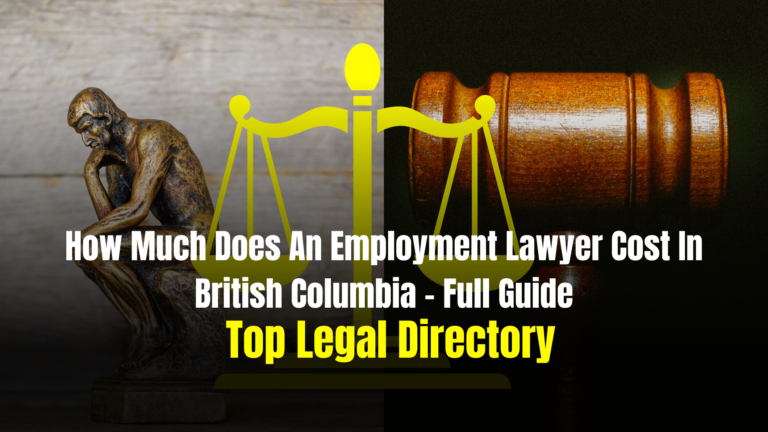How To Find A Lawyer In Toronto – Know All The Steps
Finding the right legal representation in Toronto can be an overwhelming task, especially when you’re unfamiliar with the legal landscape.
The process of “How to find a lawyer in Toronto” involves more than just a simple search; it demands a careful understanding of your specific needs, thorough research, and, most importantly, trust.
To find a lawyer in Toronto, it’s essential to pinpoint your legal needs, explore recommendations, validate credentials, and understand the fee structures.
Furthermore, leveraging legal aid and pro bono services can offer quality representation without breaking the bank.
How to Find a Lawyer in Toronto – Short Answer
When you’re in a bustling city like Toronto and need legal assistance, the sheer number of available options can be both a boon and a challenge. Start by clearly identifying your specific legal requirements, be it family, criminal, or corporate law.
Personal referrals often prove invaluable, so tap into your network for trusted recommendations. Once you have a potential list, prioritize initial consultations. This step is your window to gauge their expertise and approach. Ensure they’re licensed to practice in Toronto and have a commendable track record.
Dive into online platforms for broader insights, understanding their billing nuances, and evaluating their accessibility. If budget constraints loom large, explore legal aid or pro bono services. Remember, a transparent agreement and consistent communication are the pillars of a fruitful lawyer-client relationship.
All in all, while the journey might seem intricate, with the right steps, you’re well on your way to finding the perfect legal ally in Toronto.
Check out our directory to find our top lawyer in Toronto
Comprehensive Guide to Finding a Lawyer in Toronto
Navigating the legal landscape in Toronto can be a daunting experience, especially for those unfamiliar with the intricacies of the law. But fear not; this guide is meticulously crafted to offer a step-by-step approach to help you identify and select the perfect legal representation tailored to your unique needs in Toronto.
Identifying Your Legal Requirements
The initial phase of seeking legal representation hinges on identifying your precise needs.
Just as medical doctors specialize in specific fields, lawyers, too, have their niche areas like family law, criminal law, or corporate law.
Recognizing the core nature of your legal conundrum enables you to filter out unrelated legal professionals, streamlining your search process. Moreover, understanding your objectives is equally crucial.
Are you in the quest for a settlement? Need legal counsel? Or are you aiming for representation in a trial? Clarifying your objectives from the outset can steer your quest in the right direction and help you find an attorney aligned with your goals.
Embarking on Research and Gathering Referrals
Personal references often prove invaluable in the hunt for a reliable lawyer. Those around you, be it friends, family, or colleagues, can share their experiences, giving you a candid snapshot of a lawyer’s prowess and efficacy.
This grassroots approach often yields more genuine results than generic online reviews. Furthermore, turning to local bar associations can be highly beneficial.
These entities maintain a comprehensive roster of lawyers, categorized by their area of expertise.
Their endorsement ensures that you’re liaising with professionals who adhere to the highest standards of legal practice.
The Importance of Consultation and the First Encounter
First impressions matter, and nowhere is this truer than in the realm of legal representation.
An initial consultation with a potential lawyer can be incredibly illuminating. It’s not just about assessing their professional credentials but also about gauging their persona and approach.
A well-constructed set of questions can be instrumental during this phase. Inquiries about their past performance, strategy for your specific situation, and overall approach can provide clarity. Equally vital is to evaluate their communication demeanour.
An ideal lawyer is a blend of expertise and empathy, possessing not just the knowledge but also the human touch.
Ensuring Qualifications and Gauging Experience
Toronto, like all major cities, has its legal protocols and standards. As such, verifying that your lawyer is licensed to practice in Toronto is non-negotiable.
This validation serves as a dual assurance, confirming their legitimacy and familiarity with Toronto’s legal nuances.
But licensing is just the tip of the iceberg. Digging into their past cases, especially ones mirroring yours can shed light on their capability.
A consistent record of favourable outcomes is a beacon of their proficiency and an indicator that they can adeptly navigate your legal maze.
Utilizing Online Platforms for Research
The digital revolution has democratized access to information. When hunting for a lawyer, online platforms and legal directories can be treasure troves of information.
These platforms collate ratings, reviews, and feedback, offering a panoramic view of a lawyer’s reputation.
But don’t just stop at third-party reviews. Venturing onto a lawyer’s official website or social media footprint can yield richer insights.
These platforms often showcase testimonials, case studies, and other valuable information that can inform your decision-making process.
Deciphering Legal Fees and Exploring Payment Options
Navigating the financial aspect of legal representation can be as intricate as the legal process itself.
The cost of hiring a lawyer varies widely based on the complexity of your case and the lawyer’s expertise. While some lawyers bill hourly, others might offer a flat fee for specific services.
Some might ask for a retainer, which acts as a down payment towards future services. Beyond the primary fee, it’s pivotal to discuss ancillary costs. These can include court fees, administrative costs, or expenses related to gathering evidence.
If you’re working on a tight budget, broach the topic of flexible payment plans. Many lawyers understand the financial constraints their clients might face and offer tailored payment options to alleviate the burden.
Prioritizing Accessibility and Convenient Location
Legal proceedings often involve multiple meetings, document exchanges, and consultations.
Hence, the geographical location of your lawyer’s office becomes a practical consideration.
An office situated conveniently can save time and reduce travel-induced stress. But beyond mere geography, the concept of accessibility extends to how approachable and available your lawyer is.
Can you reach out to them with a query outside of scheduled meetings? Do they respond in a timely manner?
A lawyer who is both geographically accessible and communicative can significantly ease the legal journey, providing reassurance and clarity.
Delving into Legal Aid and Opportunities for Pro Bono Services
The cost of legal services can be daunting, especially for those with limited financial resources.
However, the legal community recognizes this challenge and offers avenues for assistance.
Legal aid is one such provision designed to assist those who might not afford standard legal fees. Eligibility for legal aid varies, and it’s worth exploring if you qualify.
Moreover, some lawyers are committed to offering pro bono services – essentially free legal aid, driven by a sense of community service. If your lawyer doesn’t offer pro bono services, they might know colleagues who do.
Leveraging these avenues can ensure that financial constraints don’t impede access to quality legal representation.
Establishing a Transparent Client-Lawyer Agreement
Choosing a lawyer is merely the first step. As you embark on your legal journey, it’s essential to formalize the relationship through a well-articulated agreement.
This agreement, often termed the terms of engagement, spells out the nature of the relationship.
It details the services the lawyer will provide, the fee structure, and both parties’ rights and responsibilities. This document acts as a roadmap, ensuring there are no ambiguities down the line.
Both you and your lawyer should review this agreement in detail, ensuring mutual understanding and alignment on all terms.
Continual Communication and Follow-ups
The dynamics of the lawyer-client relationship are built on trust, and communication is its cornerstone. As your case progresses, staying updated becomes vital.
Establish a communication protocol with your lawyer, outlining how and when you’ll receive updates.
Whether it’s through scheduled meetings, emails, or phone calls, consistent follow-ups are essential.
Not only do they keep you informed, but they also provide an avenue to address any concerns, doubts, or changes in circumstances.
A lawyer who prioritizes communication ensures that you’re never in the dark, fostering confidence and trust in the process.
Conclusion
Navigating the legal waters of Toronto doesn’t have to be a daunting task. With the right approach and resources, you can find the ideal legal representation tailored to your unique needs.
Remember, it’s not just about finding any lawyer, but the right one. By understanding your requirements, conducting thorough research, and ensuring transparent communication, you lay the foundation for a successful legal partnership.
Furthermore, always consider the financial aspects and available support options to make the journey smoother and more affordable.
also read about:
FAQs
What are the key factors to consider when searching for a lawyer in Toronto?
When searching in Toronto, prioritize a lawyer’s area of expertise, their location for accessibility, client reviews, and their fee structure.
How can I verify a Toronto lawyer’s credentials and experience?
Check with the local bar associations in Toronto, review their online profiles for case histories, and ask directly about their experience during consultations.
Are there cost-effective options for legal representation in Toronto?
Yes, many lawyers in Toronto offer flexible payment plans, and you can also explore legal aid or pro bono services for affordable options.
How do online platforms help in finding a lawyer in Toronto?
Online platforms provide ratings, client reviews, and insights into a lawyer’s specialization, aiding in informed decision-making for legal representation in Toronto.






